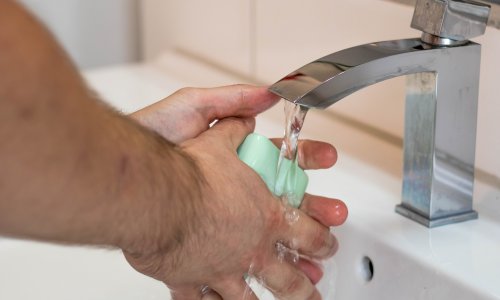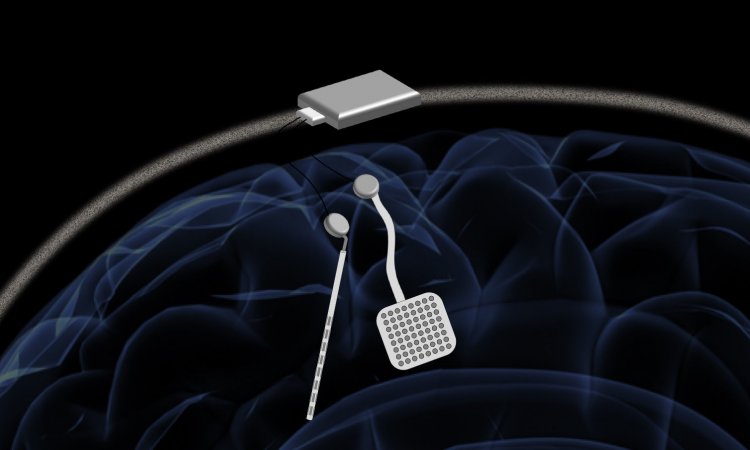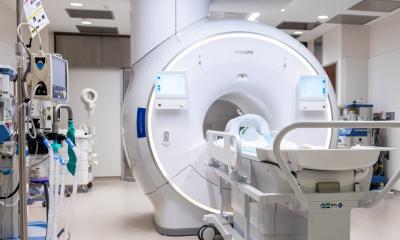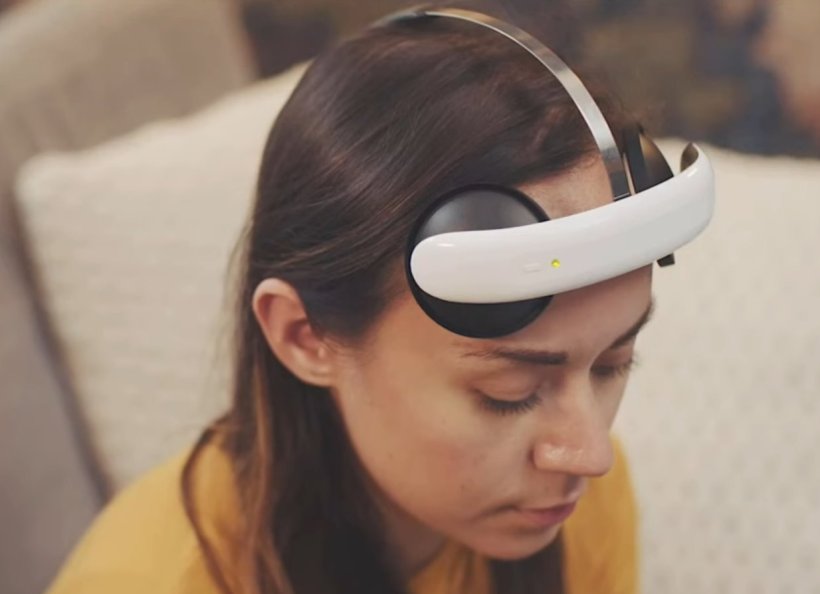
Screenshot: YouTube/Flow Neuroscience
Article • Technology-based therapy approach
Self-administered brain stimulation as a novel tool for depression treatment
Report: Cornelia Wels-Maug
The stark reality of depression is evident in the latest World Health Organization (WHO) statistics, indicating that around 280 million people worldwide suffered from depression in 2019.1 The Covid-19 pandemic has intensified the global focus on depression, with a report from the Organisation for Economic Co-operation and Development (OECD) in May 2021 revealing a "significant and unprecedented" deterioration in population mental health in 2020 compared to 2019. National estimates showed a doubling or tripling of depression prevalence in many European countries.2 A WHO publication from March 22 reported a 25% increase in the global prevalence of anxiety and depression triggered by the pandemic.3
Unfortunately, traditional treatments for depression, primarily medication, have shown limited efficacy. According to the Economist Group, in Europe, 'Only 40% to 60% of patients achieve remission after initial antidepressant treatment, regardless of the chosen drug'.4 Psychotherapy also faces challenges such as limited success, restricted access and long waiting times. These factors contribute to a substantial number of patients classified as partial or non-responders, leading to a lower quality of life, increased comorbidity, and social and occupational disability.5
With the WHO predicting major depressive disorder to become the leading cause of disability globally by 2030, the outlook is grim.6
Alternative technology-based approaches
Given the limited success of traditional therapies, recent years have witnessed the emergence of technology-based interventions for depression. One such intervention is transcranial electromagnetic stimulation (TMS), a noninvasive use of magnetic fields to stimulate the brain, approved by the Food and Drug Administration (FDA) in 2008.7 However, it is considered costly and trials have concluded that TMS is associated with a small risk of seizures.
Another promising noninvasive brain stimulation technique is transcranial direct current stimulation (tDCS). tDCS, with its potential cost-effectiveness, easy application, and safe profile, applies a weak direct current through scalp electrodes to modify neuronal excitability. Clinical trials have shown tDCS to have a similar impact as antidepressants, with fewer and less severe side effects.
To enhance tDCS's therapeutic efficacy, it has been integrated with psychological interventions and is mainly used by licensed physicians in clinical settings.
Bringing tDCS home with Flow
I think it’s extremely important that people have access to a large toolbox. We are here to provide something that augments current treatment options or acts as an alternative
Daniel Månsson
Daniel Månsson, a clinical psychologist with a BSc in Computer Science, recognized the need to make depression treatment more accessible: 'I can treat five to eight people per day, but this is not enough given the large number of people affected by it.' Teaming up with neuroscientist Erik Rehn, they founded the neurotech company Flow Neuroscience and developed Flow. Unlike other medical-grade tDCS devices, Flow is designed for home use, empowering individuals to self-manage their treatment. The solution aims to provide effective treatment without the drawbacks of side effects, long waiting times, high costs, or social stigma associated with traditional approaches.
While Flow does not aim to replace traditional treatments, it seeks to expand therapeutic options and provide a complementary approach to existing treatments. 'I think it’s extremely important that people have access to a large toolbox. We are here to provide something that augments current treatment options or acts as an alternative,' Månsson said.
How it works
Flow combines a medical-grade tDCS headset with an app-based behavioral therapy program, offering a holistic approach to depression treatment. The Flow headset, with two electrodes placed on the frontal part of the head, delivers a noninvasive treatment by sending a weak current into the left side of the brain, which activates neurons on the left, influencing feelings, thoughts, and inner mental processes. The overall effect is comparable to antidepressants but without the associated side effects. Månsson explained: 'What is unique about Flow is that it is a medical-grade, one size fits all tDCS treatment for depression that can be used at home.'
Flow's effectiveness and safety are supported by real-world data and clinical evidence from a large randomized placebo-controlled trial. The Flow 2023 study conducted among 174 participants in the UK and the US showed that 56% of them experienced a complete removal of depression symptoms (remission) within 10 weeks, whilst an additional 6% were measured to have an improvement in symptoms of at least 50%. No major side effects were reported from the treatment group. Overall, a greater than threefold increase in the odds ratio of substantial improvement with active treatment compared to placebo/sham stimulation were measured. Flow’s effectiveness surpasses the average effect size witnessed in trials for the 21 best-selling antidepressants in the UK and the US.
Flow has received CE approval in the EU, Great Britain, and Brazil, with FDA approval expected by mid-2024. Currently, Flow has approximately 17,000 users and its largest market is the UK. Worldwide over 150 clinics deploy Flow, most of them based in the UK, some are in Switzerland, Germany, and Brazil. However, Flow is available over the counter in all EU countries and some Asian countries have also shown interest in the product.
Recommended article
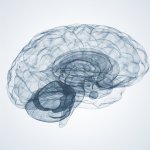
Article • Cerebral insights
The brain: mysterious grey matter
More than 80 billion neurons, trillions of synapses and almost 6 kilometres of neural pathways: The brain is an anatomical masterpiece – and still puzzles science. Keep reading to find out about latest research and therapies of brain diseases.
User endorsements and future outlook
Flow has garnered broad endorsement from users, although the company acknowledges that individual outcomes may vary. More research into the longer-term effects of tDCS treatment are needed.
The company is looking into expanding the duration of the treatment regime as well as its geographical reach. Additionally, it explores cooperating with psychiatrists, general practitioners, clinical psychologists, and other healthcare professionals. Flow's broader application to conditions like bipolar disorder, post-traumatic stress disorder (PTSD) and pain management shows promise, indicating the potential of stimulating neurons in addressing various brain-related disorders.
Literature:
- World Mental Health Report: Transforming Mental Health for All. Geneva: World Health Organization (2022)
- Tackling the Mental Health Impact of the COVID-19 Crisis: An Integrated, Whole-of-Society Response. Paris: Organisation for Economic Co-operation Development, 2021.
- WHO Director-General’s opening remarks at the media briefing on COVID-19 – 2 March 2022 [Press Release]. Geneva: World Health Organization, 2022.
- Depression in Europe, p. 12, The Economist Group 2022
- Perez-Sola V, Roca M, Alonso J, et al. Economic impact of treatment-resistant depression: A retrospective observational study. Journal of Affective Disorders. 2021;295:578-86
- Liu Q, He H, Yang J, et al. Changes in the global burden of depression from 1990 to 2017: Findings from the Global Burden of Disease study. Journal of Psychiatric Research. 2020;126:134-40
- Connolly KR, Helmer A, Cristancho MA, Cristancho P, O’Reardon JP. Effectiveness of transcranial magnetic stimulation in clinical practice post-FDA approval in the United States: results observed with the first 100 consecutive cases of depression at an academic medical center. J Clin Psychiatry 2012;73:e567-e573
02.01.2024



